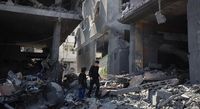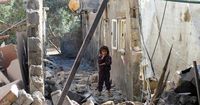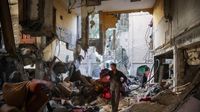The humanitarian crisis in Gaza has deepened following a series of deadly airstrikes by Israeli forces, prompting the United Nations to reduce its aid operations in the region. Amid escalating violence and disruptions to humanitarian efforts, the UN Secretary-General recently announced on March 24, 2025, that a significant number of international staff would be temporarily relocated from Gaza.
This latest decision comes after a week of renewed Israeli bombing, which began on March 18, 2025, following a period of relative calm lasting nearly two months. The UN has reported devastating strikes in Gaza, with the Israeli military claiming it aims to apply pressure on Hamas during the ongoing conflict. Local health officials estimate that nearly 700 people, primarily women and children, have been killed since hostilities resumed.
The situation escalated further when Israeli strikes hit a UN compound in Deir Al Balah on March 19, resulting in the death of a Bulgarian UN staff member, as well as severe injuries to six others from various nations, including France and the UK. According to UN Spokesperson Stéphane Dujarric, “the strikes hitting a UN compound were caused by an Israeli tank,” as tensions intensified. The UN reiterated its commitment to providing lifesaving assistance despite these challenges, although the organization faces increasing risks.
In southern Gaza, rescue operations are hampered by ongoing bombardments. On March 23, bombing resulted in casualties when the surgical department of the Nasser Medical Complex was hit. Reports describe relentless bombardment leading to significant destruction and displacement; 124,000 people have fled their homes according to the UN agency for Palestinian refugees, UNRWA, which warns of rising food scarcity and soaring prices due to an Israeli blockade.
Family members are left with little choice but to seek refuge wherever they can, often fleeing at night for safety. Communication challenges have further complicated relief efforts; the Palestine Red Crescent Society reported the targeting of several ambulances and the loss of communication with their teams in Rafah for over 30 hours, raising serious concerns for their safety.
On March 24, the Israeli military also announced the evacuation of residents from several northern towns, including Jabalia and Beit Hanoun, in anticipation of further military operations. Prime Minister Benjamin Netanyahu has stated that the offensive aims to compel Hamas to release the remaining 59 hostages still held in Gaza, a situation that echoes the long-standing tensions in the area.
During this turmoil, the Israeli military emphasized that they had “eliminated” an Al Jazeera journalist, Hussam Shabat, whom they described as a “sniper terrorist,” claiming he was affiliated with Hamas. Al Jazeera condemned the killing, stating that their journalist was simply doing his job and was killed when his vehicle was struck. The death has drawn outrage from multiple advocacy groups, highlighting the perils faced by journalists covering the conflict in Gaza.
Reports indicate that more than 50,000 Palestinians have died since the beginning of the conflict, with the ongoing violence disproportionately affecting women and children. In a related incident, a Palestinian man was shot dead by Israeli forces near Rafah, as Israeli airstrikes continue to target various parts of the territory. As per health officials, these strikes have claimed the lives of at least 23 people on March 25 alone.
The Israeli military maintains that its operations are necessary for national security, particularly following Hamas’ surprise attack on October 7, 2023, which resulted in the deaths of approximately 1,200 Israelis. As the conflict continues, the ramifications on civilian life are catastrophic, with humanitarian organizations calling for immediate relief efforts and accountability for attacks on health facilities and UN compounds in particular.
In the wake of these events, various organizations have called for a comprehensive investigation into the bombardments affecting civilian infrastructures and the tragic loss of life. A full report on the recent strikes is not only essential for accountability but also for protecting civilians caught in this protracted conflict.
As the conflict rages on, tensions remain high, underscoring the urgent need for a resolution that prioritizes the safety and rights of all individuals affected. The United Nations and international community remain poised to seek avenues to address the escalating humanitarian crisis and advocate for the protection of civilian lives amid warfare.
From the streets of Gaza to international headlines, the situation is dire, and the hope for peace feels as far away as ever. With civilians left to bear the brunt of military operations, calls for action have reached a fever pitch.






